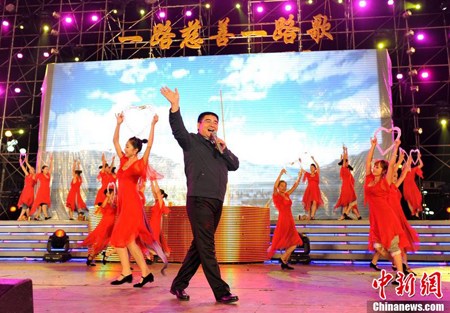Same goal, different approaches
In June 2010, at the urging of U.S. billionaires Bill Gates and Warren Buffett, 40 of the world's richest families promised to give at least half of their fortunes to charity. By "Giving Pledge," they promised to donate a collective sum of at least $125 billion.
Then on September 29, 2010, the two billionaires hosted a dinner in Beijing for some of China's richest individuals, hoping to persuade some of their guests to give more. Some of the invited did not show up that night, however, lest they be persuaded to part with their riches.
Chen Guangbiao was also invited to the event, where he declared that he would donate all of his money to charitable uses after he dies.
Though Chen shares the same goal with Gates and Buffett, their approaches to charity are quite different. Gates and Buffett have both set up foundations as non-governmental organizations, which provide money for charitable causes. The foundations have nothing to do with the government or their companies, and annual reports are released every year for public scrutiny.
In comparison, Chen's approach is more direct and occurs randomly, causing the public to question him about his lack of a more scientific system.
Backward mechanism impedes non-official philanthropy
Philanthropic resources are scarce in China, with charity donations accounting for less than 1 percent of the GDP. Under such circumstances, we need to make good use of it and avoid imbalance. Bill Gates once said that charity is more difficult than making money, because it requires the spirit of being scrupulous about every detail, and is not as simple as just giving out cash. It is quite a challenge for philanthropists to make better use of limited resources.
The problem of irregular public assistance systems and unsound charity organizations is a pain in China. Even in big cities like Guangzhou, the number of organizations that are serious about charity management is easily counted, and the resources they possess are very limited. Handa, for example, was founded 15 years ago and is a comparatively mature non-governmental organization, but it has only been able to do trivial things because of limited funds coming mainly from the international community. When faced with the enormous needs of society, Handa sometimes appears incapable.
For a long time the government has been in full charge of the charity business in China, and all donations must be approved by the government first, which constrains the development of grassroots organizations. The government should loosen controls of the status of organizations as well as charity resources and donations, and consider tax-free and preferential policies.
Since the "Guo Meimei Incident," China's official charitable institutions have suffered a shortage of donations, especially the Red Cross. According to the Beijing Times, between June and August donations to charities in China dropped by nearly 90 percent to 840 million yuan ($129.9 million), compared to the period from March to May.
Some scholars say it is high time for the government to improve the mechanism in order to facilitate philanthropists and countless anonymous donors.
China has not developed into a country actively engaged in the charity cause. There is no doubt that the establishment of an active atmosphere needs a platform to encourage the public to freely participate and fosters a sense of social responsibility, which would hopefully increase the benevolent spirit in everyone.


















